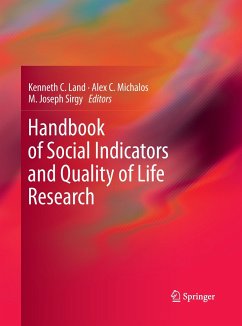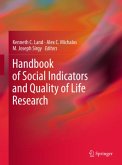The aim of the Handbook of Social Indicators and Quality of Life Research is to create an overview of the field of Quality of Life (QOL) studies in the early years of the 21st century that can be updated and improved upon as the field evolves and the century unfolds.
Social indicators are statistical time series "...used to monitor the social system, helping to identify changes and to guide intervention to alter the course of social change". Examples include unemployment rates, crime rates, estimates of life expectancy, health status indices, school enrollment rates, average achievement scores, election voting rates, and measures of subjective well-being such as satisfaction with life-as-a-whole and with specific domains or aspects of life.
This book provides a review of the historical development of the field including the history of QOL in medicine and mental health as well as the research related to quality-of-work-life (QWL) programs. It discusses several of QOL main concepts: happiness, positive psychology, and subjective wellbeing. Relations between spirituality and religiousness and QOL are examined as are the effects of educational attainment on QOL and marketing, and the associations with economic growth. The book goes on to investigate methodological approaches and issues that should be considered in measuring and analysing quality of life from a quantitative perspective. The final chapters are dedicated to research on elements of QOL in a broad range of countries and populations.
Social indicators are statistical time series "...used to monitor the social system, helping to identify changes and to guide intervention to alter the course of social change". Examples include unemployment rates, crime rates, estimates of life expectancy, health status indices, school enrollment rates, average achievement scores, election voting rates, and measures of subjective well-being such as satisfaction with life-as-a-whole and with specific domains or aspects of life.
This book provides a review of the historical development of the field including the history of QOL in medicine and mental health as well as the research related to quality-of-work-life (QWL) programs. It discusses several of QOL main concepts: happiness, positive psychology, and subjective wellbeing. Relations between spirituality and religiousness and QOL are examined as are the effects of educational attainment on QOL and marketing, and the associations with economic growth. The book goes on to investigate methodological approaches and issues that should be considered in measuring and analysing quality of life from a quantitative perspective. The final chapters are dedicated to research on elements of QOL in a broad range of countries and populations.








